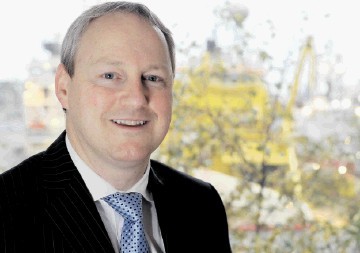
Things could have turned out very different for James Edens. Instead of running the North Sea and Africa operations of Canadian Natural Resources (CNR) he could quite easily have continued his work in heart research, started at university.
Reservoir engineering and heart research are not all that dissimilar, according to the relaxed but driven executive.
His degree in engineering physics included a paper on vibration control on structures in space, where theoretically there is nothing to stop the vibration.
Enjoying a challenge, he took up a research job modelling electric waves through the heart.
A job offer from energy giant Shell came as a complete surprise.
“I was shocked,” said Mr Edens, 46, adding: “What would they want me to do in pumping petrol?
“They then showed me all the opportunities and I was fascinated by it and actually found out pumping water through reservoirs was very similar to the modelling of electrical waves through the heart I had been researching.”
He once thought the oil industry emerging off Nova Scotia would not offer him much.
“I wanted to get a proper job,” he said, adding: “I chose the course (engineering physics) as it kept my options open and I went and worked in heart research in my spare time.”
He had seen the fishing boat-building business built up by his father, and where he spent summers working, ended by a moratorium on fishing off Nova Scotia.
The family was brought up in the Canadian province after his Irish father settled there, having met his wife when a telecommunications cable-laying vessel on which he had been working stopped in Halifax.
Inspired by the boat-building industry in Belfast, Mr Edens sen went into boat repair and then building.
When the business was ended in 1984, he went into oil rig inspection.
James had his first taste of the industry too before university, spending a year working as a labourer in a machine shop.
Shell took him to Calgary for work in water flooding and then the Netherlands in technical development, where the seeds of his love for Europe were sown.
After a few years and looking for a new challenge, he took a regulatory job with the Canadian government “on the other side of the fence”, however, he soon realised that he missed Europe.
He said: “I found I missed Europe hugely. The history, the people, the multiculturalism and the business. Nova Scotia felt flat.”
He joined CNR in November 2000, not long after the company bought into the North Sea through its acquisition of fellow Canadian firm Ranger Oil, and soon moved to Guildford in the UK.
Starting as exploration engineer for the Kyle field, Mr Edens worked on acquisitions and divestments: building a portfolio and becoming manager of exploitation for the North Sea, then director of exploration, before being appointed MD of CNR International (UK).
By then, the company had acquired the Ninian fields and moved into Aberdeen, rapidly building up its workforce and capacity.
CNR International was also building up its west African assets from the Granite City and at peak was producing 125,000 barrels of oil per day. Now it is ramping up investment off Africa once again, including forging plans to explore off the coast of South Africa, but at the cost of investment in the North Sea.
Despite having initially shunned a career in the oil and gas industry, Mr Edens has become a strong advocate for it, especially in the wake of Chancellor George Osborne’s £10billion tax grab revealed in the Budget last March.
He said that this and other tax hits over the past decade had made operating in the North Sea less attractive.
Mr Edens, a board member at industry body Oil and Gas UK, added: “Our business model is being a successful late-life field developer.
“We came to this basin to employ this skill set but in the last 10 years we have seen our reward for that sink 50% through three successive tax changes.
“Interest in utilising capital in this basin shrank in accordance with that.
“At least half of our inventory is now ‘fiscally trapped’.
“My job is to create value but right now we’re doing it at half speed.”
He said that the difference between a suitable fiscal climate and the current regime was 20 years in terms of field life.
Nevertheless, CNR International (UK) will be spending more than £200million on North Sea projects over the next year.
Mr Edens’ idea of bliss is split between the frenetic pace of life at CNR and the escape of sailing his 40ft yacht with his four children and wife, Robin.
He would like more time on his yacht, although the prospects for it being used as an escape craft back to Nova Scotia any time soon are slim.
Mrs Eden, who has trained in neurology and law, shares her husband’s interest in horse-riding when they are not so busy with their children.
Their four children were each born in a different country as a result of Mr Edens’ career.
“We picked them up like souvenirs everywhere we have gone,” he joked, adding: “My wife has said she is not moving any more.”
Recommended for you
